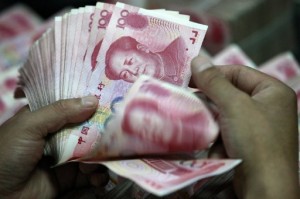China’s yuan currency ‘no longer undervalued’–IMF
BEIJING, China – China’s yuan currency, which Washington has long alleged was manipulated, is “no longer undervalued”, the International Monetary Fund said Tuesday.
The value of the yuan, also known as the renminbi, has been a source of tension for years, with China’s major trade partners — led by the United States — accusing Beijing of keeping it artificially low to give Chinese exporters an unfair competitive advantage, which Beijing denied.
“Our assessment now is that the substantial real effective appreciation over the past year has brought the exchange rate to a level that is no longer undervalued,” the IMF said in a statement after a consultation mission to China.
China keeps a tight grip on the value of the yuan out of concerns that unpredictable currency inflows and outflows could harm the economy and weaken its financial control.
But it is still pushing for the currency to play a greater role in the world financial system, such as being included in the basket that makes up the IMF’s own “special drawing rights” reserve currency.
US: yuan still too low
The yuan has been one of the world’s most stable currencies, with day-to-day volatility strictly limited by the authorities.
It spent almost two years around the 6.82 to the dollar level until May 2010, before appreciating, under US pressure, to a high of 6.04 in January 2014.
But with Chinese economic growth slowing, the currency slid back. It traded little-changed at 6.21 after the IMF announcement.
Washington nevertheless held its position Tuesday, with an official of the US Treasury, who asked not to be identified, insisting that the yuan remains too cheap.
That has been the official position for years in the Treasury’s semi-annual assessment to Congress about the currencies of the country’s major trading partners.
The most recent report last month conceded that on a trade-weighted, inflation-adjusted basis, the currency had risen 10 percent against the dollar over the previous six months.
But even with that, it remained “significantly undervalued”.
US Treasury Secretary Jacob Lew last week reiterated the opinion, urging China to make more progress on foreign exchange reforms, according to Bloomberg News.
Fawad Razaqzada, an analyst with London-based currency trading platform Forex.com, was skeptical about the IMF findings.
“It probably will give the Chinese authorities an excuse to hold down the value of the yuan, especially against currencies where the central banks are still pretty much dovish such as the euro,” he told AFP.
“Against the dollar they won’t need much help anyway, as the greenback will most likely appreciate further as the market prepares for a rate hike later this year,” he added.
Yuan to join SDR?
The IMF nevertheless was critical of Beijing’s world-leading foreign exchange reserves — $3.73 trillion at the end of March — and urged “greater exchange rate flexibility, a key requirement for a large economy like China’s.”
“The still-too-strong external position highlights the need for other policy reforms — which are indeed part of the authorities’ agenda — to reduce excess savings and achieve sustained external balance,” the Fund said.
China has slowly loosened controls on the international use of the yuan. The currency is now among the top ten held as reserves by foreign countries.
Beijing has set up yuan clearing arrangements with 10 countries and regions and signed currency swap agreements with 28 central banks.
It has also permitted Chinese and foreign entities to issue yuan-denominated “dim sum bonds” in the international market, though the total issued remains relatively small.
The Beijing-led Asian Infrastructure Investment Bank, which aims to support infrastructure development across the continent, is also expected to facilitate wider international use of the yuan.
China is now also pursuing the inclusion of the yuan in the basket underpinning the IMF’s SDR currency, currently based on only the US dollar, the euro, the Japanese yen and the British pound.
The Fund will be reviewing the SDR basket later this year, with the yuan’s potential as a component a key subject.
